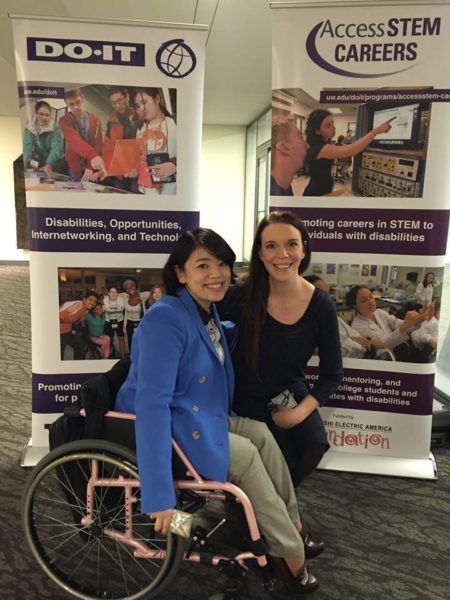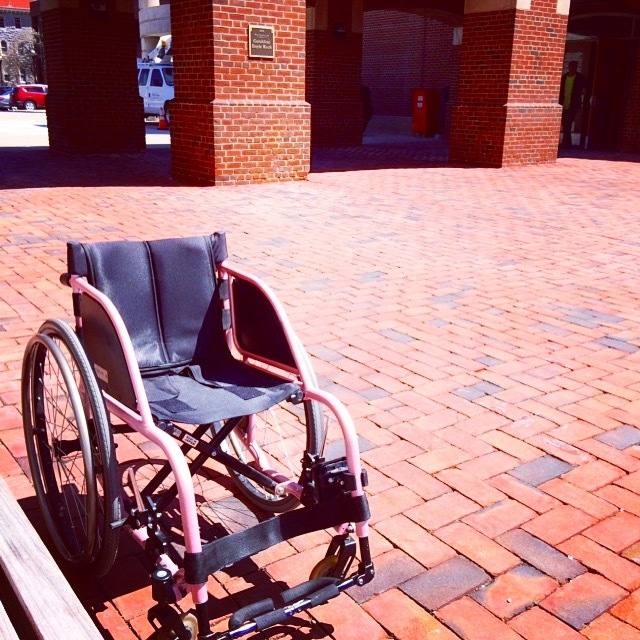This article is also available in: 日本語
*** Part 1 is here***

Though DO-IT hosts many programs, the most remarkable is the ”Scholars Program” to which any high school sophomore or junior with disabilities in Washington State may apply. Once the selected, students can learn about college life throughout the school year and the upcoming summer. The students experience life in dorms including managing their meal card budgets and navigating a busy food court. By experiencing real college life, students with disabilities notice things they need assistance with and think of what kind of support they need. They also practice how to communicate with faculty to ask for accommodations.
The interesting part of the Scholar Program is that all Scholars since 1993 when the program started are connected via internet to exchange information. Today, the internet is a big part of our life. However in 1993, no high school students used internet in daily life. So this program was very innovative. DO-IT lends laptops and accessible hardware and software to the Scholars for long-term use so that the Scholars can expand their abilities at school, at home, and everywhere.

Sheryl said,
“What DO-IT does is facilitating and trying to create an environment where these positive things happen without us doing it all. Kids support each other but they need a facilitator, because it is not always a natural situation for students who are blind to engage with autistic students for example. That has to be facilitated. Leaders of people with disabilities are not showing up suddenly. Through various experience, people become leaders. I want to raise future leaders from DO-IT.“
DO-IT does not teach students with disabilities what they need from 1 to 10. But DO-IT is giving opportunities to let students with disabilities realize what they need and gain an ability to be self-advocates. The Scholars Program includes a wide range of disabilities. This is because each Scholar can notice things they are not good at, but also things they can help for someone with their abilities.

During the interview, I found a very American activity in the Scholars Program. On the last day of summer program, DO-IT holds a dance party. A dance party is not common in Japanese culture, but in the US, it is common for high school students to dress up and go to a prom. DO-IT doesn’t think that a dance party itself is the most important event in life, but still DO-IT wants students with disabilities to have the opportunity to experience an event that might intimidate them at their own school. The dance hall has DJ, music, and pizza which students love. Some students feel too shy to dance with everyone. In that case, the students are asked to spend time with other students and stay engaged in the environment.

In English, “self-advocacy” means that people with disabilities speak up for themselves to ask for what they need to resolve issues around them. American society considers having opinions and speaking up is very good. Kids learn that naturally through their daily life at home and school. However, for kids with disabilities, sometimes adults intervene too much at home and school. Then kids with disabilities miss opportunities to learn to self-advocate themselves.
Japanese society is opposite to American society. Japan has a more group-oriented culture and cooperativeness is very important. The tendency of adults who intervene with kids with disabilities is very similar. Last summer, I wrote an article “Please do not overprotect kids with disabilities” (*1). The main reason why I wrote the article is because this really affects kids’ self-advocacy skill. Experiencing what non-disabled kids do is very meaningful to disabled kids too. “What if my kid fails?” “What if my kid is bullied?” Parents are always worried. But if the parents overprotect their kid with disabilities, the kids miss chances to try and to build up their skills, experiences and confidence. Experiencing by themselves is essential for them to grow.

I have mobility disability since 2 years old. But my parents let me experience lots of things like other non-disabled kids, so I was thinking that I have good self-advocacy skill. However after I came to Syracuse, I found that “Oh, US is different.”
Syracuse University is a very hilly campus which is hard for manual wheelchair user. So, I contacted a office which supports faculty with disabilities (*2) to ask where I can rent a power wheelchair. Soon I got a reply. It was so fast and I was amazed. In the email, however, the office said “Here is a list of welfare supply stores in Syracuse.” Soon I realized that “Oh, this means I have to contact by myself!” In Japanese college, we don’t have the same kind of office that assists students with disabilities to support only people with disabilities, so I cannot compare between US and Japan. But, I suppose, if Japanese staff gets same email from me, she/he would contact those stores on the list and then reply me “You can rent a power wheelchair in this place and this place.“ I was expecting this level of support, so I was shocked. In here in the US, even foreigners, even people with disabilities, they gotta do things by themselves first. If any questions, they can ask. U.S. is like that.
*1 “Please do not overprotect kids with disabilities” (Japanese Only)
*2 Interview report of Equal Opportunity, Inclusion and Resolution Services at Syracuse University
Reasonable Accommodation for Employees with Disabilities Is Supported by The Entire Firm
